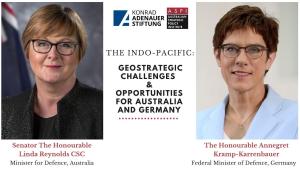In light of the recently released German Government Policy Guidelines on the Indo-Pacific and the Australian Government’s Strategic Update 2020, the Ministers discussed their countries’ respective approaches to a rapidly evolving strategic environment. Minister Reynolds explained that changes in the strategic environment required adjustments to the prevailing modus operandi: how militaries innovate, in terms of capabilities, organization and long-term strategic thinking. As a reflection of this need for greater prioritization, she referred to the key tenets of the Strategic Update to “shape the region, “deter actions against Australia’s interests and, when required, respond with military force. The Update made clear, according to the Minister that these are underpinned by a “shared respect for the sovereignty of all nations”, which above all constitutes the foundation of “what unites us”.
Similarly, threats to sovereignty were also a key theme in the German Defence Minister’s address, which she delivered as part of a ‘virtual tour’ to the region. Minister Kramp-Karrenbauer, referring to Russia’s occupation of Crimea, highlighted that for the first time in a long while “we are seeing territorial orders changed by violence again in Europe”. She drew attention to the importance of ensuring freedom of navigation in the Indo-Pacific as a parallel. Given the serious challenge to the effectiveness of conventional military capabilities posed by the rapid pace of technological adaption and invention, Minister Kramp-Karrenbauer also stressed the need for greater cooperation in the cyber and information environment in this regard.
This comes against the backdrop of a growing recognition in Germany that, in light of systemic rivalries and a changing transatlantic relationship, there is a need for Germany to shoulder more responsibility through its foreign and defence policy. Minister Kramp-Karrenbauer had previously advocated for Germany (and Europe) to play a more assertive role and “produce security and stability where it matters”.
The German Government’s new Policy Guidelines for the Indo-Pacific, released in September this year, signal a distinct commitment on Germany’s part to actively contribute to shaping the rules-based order - whose future is seen to be determined in the Indo-Pacific. Under the heading 'Germany–Europe-Asia: Shaping the 21st Century Together', the Guidelines are intended to pave the way for closer cooperation with partners in the region – in particular ASEAN and the so-called Partners across the Globe. Minister Kramp-Karrenbauer, who had chosen Canberra as her first port of call on this ‘visit’ to the region, outlined the notable shift from the transatlantic area to the Indo-Pacific: she defined the region as a political and economic centre of gravity where the rules-based order of tomorrow would be secured. Identifying security and defence as priority areas in this regard, the Minister reiterated Germany’s readiness to expand cooperation “with those who share our values in the region, intensify our military contacts and promote dialogue on matters of security.” She flagged the expansion of Germany’s maritime presence in the Indo-Pacific - through for example joint exercises, training, embedding German officers in Australian Navy units or dispatching liaison officers to multilateral organisations in the region - as a key avenue for this.
This commitment to increased German engagement in the Indo-Pacific was warmly welcomed by the Australian side, with Minister Reynolds affirming that, especially on key issues of future security such as critical technologies and raw earths, there was “no better place to start cooperation with than Germany.” The Executive Director of the Australian Strategic Policy Institute Peter Jennings thanked Minister Kramp-Karrenbauer with “Minister, I hope that you will indeed make Australia the first port of call for this increased cooperation.”
Both Ministers emphasized the value of retaining close ties with the United States, as a key pillar of a secure global order, also through cooperation via NATO, but respectively stressed the need for developing greater. This includes the need to re-define what self-reliance means in a rapidly changing, (hopefully soon) post-COVID-19 world - where the risks and dangers to our security extend well beyond traditional military threats to pandemics, climate change and the resulting food, energy or water shortages, or disinformation campaigns. As Dr Gorawantschy drew out in her final remarks, in a highly interdependent world where economic well-being, political stability and security are interlinked, resilience and sustainability are key.
The dialogue highlighted once more that amongst the many shared concerns about the future of the rules-based order, there are also many points of commonality and opportunities for increased strategic cooperation in the Indo-Pacific to be found.



